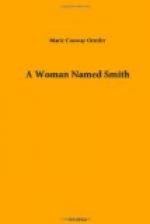“Sounds like a stark raving, doesn’t it? One can fancy the doctor feeling a bit ashamed of himself when he wrote it down.
“I rather fancied it raving, myself, until one day I came across—” here he paused, and looked at me intently—“a yellowed slip of paper between the pages of an old diary that had been accidentally discovered. I knew then that there was really something to be discovered, and that I had not been a visionary sentimentalist when I yielded to my mother’s last expressed wish that I should come here and search.
“I suppose,” he went on dreamily, “that it was in my blood, the desire to come here to Hyndsville, like a homing bird. But when my mother died, the ties that bound me to her country seemed to be in a measure loosened. Then, too, the Wanderlust had me in its grip. I put aside the profession my father had bred me to, left my affairs in what I thought capable hands, and indulged my desire to wander up and down the earth and sail the seven seas. It was upon one of these prowls that I came upon my old Achmet here, and induced a master who didn’t love him to part with him.” And he looked at the old man with whimsical tenderness.
“I am your slave,” spoke up The Jinnee, sturdily. “I am the fostered offspring of my master’s bounty. May he live a thousand years!”
That shocked my Yankee ears. Achmet smiled his crooked smile.
“Why did the sahiba follow when I showed her a broken coin?” he asked.
“Because I knew that Mr. Jelnik needed me.”
“Even in the bowels of the earth?” I was silent.
“Because he is the master!” said The Jinnee. “Therefore you obeyed. He is the master. Wherefore am I, Achmet, his slave.” Oh, shame upon you, Sophy Smith, for there was that in you, and that not the least divine part, which was in full accord with black Achmet!
“Achmet’s ideas are of the immutable East,” said Mr. Jelnik, with a faint smile. “He is archaic.” And dismissing this persiflage with a wave of the hand, he continued:
“Behold me, then, footing it up and down the highways and byways of the world. But it was as if I had disobeyed the dead, and they would give me no rest. So presently I stopped short and came to Hyndsville.
“With Richard’s directions in my possession, it was comparatively easy for me to find the passageways, and after the old woman’s death I had chance to examine the house room by room. And sometimes, Sophy, when I have been alone in this tragic old place—” he paused, and looked at me with a puzzled frown—“it has seemed to me that there were—well, secret influences, say; things outside of our sphere. I have felt a sense of horror and despair descend upon my spirit, a weight almost too heavy to bear. Sometimes it would be so powerful, so insistent, so vivid, that I had to fly from it.
“Then I happened to remember something that a gipsy, an old, old man reputed to be very wise, told me when I was a boy. He said that troubled spirits can be soothed and sent hence by music. It is the old and sure charm, as David found when he played upon the harp and drove the evil spirit out of Saul the king. I brought my violin and tried it. And,” said the cosmopolitan Mr. Jelnik, “the gipsy was right.”




